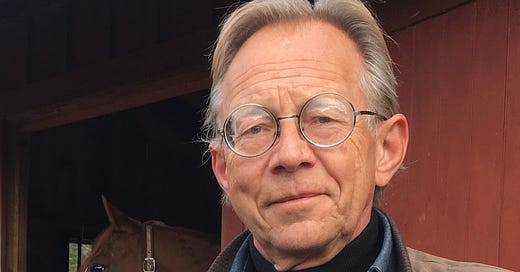For eight and a half years now, I have chronicled some of the challenges and many of the small victories of my journey toward being the person, and the doctor, I strive to be. I have painted sketches of some of the patients who have entrusted me with their care. I helped some, and failed some. I have described the things that motivate me, and I have quoted the mentors I’ve collected, real and imagined, during my 35 years as an American family doctor.
I have sometimes vented about the silliness we must deal with in health care today. But most of my writing has been about the day to day work and the day to day emotions that define me as a doctor in my adopted homeland.
For an introverted, nearsighted kid from a small town in Sweden, I’ve done pretty well, blending into another country, another culture and another system of health care. I’ve said it before, my education was superb, but I felt a bit constrained in the tightly regulated and culturally unambitious healthcare system I graduated into in 1979.
Healthcare, as many other aspects of Swedish society was steeped in the culture of only being good enough, “Lagom”, a word that makes good enough sound like a virtue.
I was restless and ambitious, and didn’t understand why people in my clinic took their coffee breaks so seriously, or why they seemed to slow down when their 3 pm break was over, even though we were open until five. I couldn’t reconcile the long waiting lists for services and the lack of panic, or at least concern, in my Chief’s eyes when we talked about “the system”.
I was also a little puzzled by the sometimes a bit bureaucratic attitude of my older colleagues toward their patients. They were nice enough, but there wasn’t the spark, the pathos, I had expected to find.
Of course, now I realize they were blunted by years of working in a system that wasn’t as patient focused as they themselves had been when they first started in medicine, just like doctors around me here in America struggle with professional frustration and burnout.
I don’t know enough about medicine in Sweden today to imagine what my life would have been like if I had spent my career there. I do know I have worked harder, made more money, seen more poverty, handled more advanced cases, and played a bigger role in many of my patients’ lives than most Swedish doctors have an opportunity to do.
I discovered a few months ago that one of my classmates became professor of medicine at Uppsala University. For a brief instant I thought, would I have wanted to be in his shoes? But I quickly dismissed the thought.
I am where I am supposed to be, working among the farmers, fishermen and retirees of this small Maine town. They have accepted and adopted me as their own, and I feel connected to every one of them.
My father used to joke that I could almost have been a priest, but my faith wasn’t strong enough, or a lawyer, but I was too honest, so medicine was the only profession open for me.
In a way, as a small town doctor, you actually sometimes perform the priestly duties of helping people forgive themselves and find hope in their despair. And, like a lawyer, you sometimes help your patients stand up against oppressive insurance companies, unfair employers or rigid bureaucracies.
Tonight, as I spend a little extra time with the cats and the goats, as I prepare the evening mash for the horses and clean their stalls for the night, I am thinking about how grateful I am for the life I have chosen.
At age four, I announced I was going to become a doctor, and fourteen years later I knew I wanted to be a small town doctor in America. I don’t know why that became my vision, but it has guided me in many small steps that finally put me in this particular little farmhouse, on this particular plot of land, in precisely this little village in this remote corner of North America.




This is brilliant. You describe the inner workings of a Family Physician especially in a rural community. Thanks for what you do, did and who you've become. Larry
And gratefully into my email. Thank you for sharing your wisdom, care and compassion.